Source: http://www.savateaustralia.com/
While Benny ‘The Jet’ Urquidez is acknowledged as the most celebrated martial artist to have defeated the Japanese Kick Boxers on their own turf, little is known about French Savate champion Christian Guillaume – who in 1969 was invited by Japanese promoters to compete against their champions. Here is his own account of his journey.
Translation by Gary Tatte
English translation (c) 2009
Two questions are often asked:
Why Japan ? Why me in Japan ?
My first visit to Japan was in April 1969; Japan was just becoming involved in kickboxing. Like every sport, the public was screaming for international competition. The Japanese were interested in French boxing, and so were the French in Japanese kickboxing. A Mr Kase, a karate teacher in France, contacted me. The Japanese promoters had asked him to send a few French karate champions capable of fighting the Japanese kick-boxers. But this type of fighting was not practiced by French karate pupils, so Mr Kase directed the promoters towards the French Savate federation, which seemed more appropriate than traditional Karate. I accepted the invitation to go with another French Boxer Claude Simonot. During our one-month stay in Tokyo we had to fight two matches. We left Paris with one stop in Anchorage. We arrived at Tokyo; the Japanese press was at the airport. We had supper at Tokyo’s ‘Maxim’ , we were received like princes. I was under the impression that I was smoking my last cigarette, before losing my head.
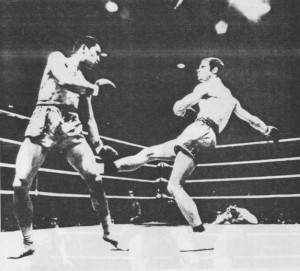
The matches were taking place in Korakuen, the Japanese temple for sport with a capacity of 10,000 spectators, every night the Nippon TV covered the fights. The tam-tam rhythm beat, in this modern building, transformed the fight into a noisy and hostile arena. Simonot and myself were dressed up in silk kimonos embroidered with huge gold dragons on the back. We received sumptuous gifts from the promoters, who could sense the local atmosphere.
The first bout involved my friend Claude Simonot, who got the ball rolling. In spite of a courageous fight, the Japanese won, everyone was happy and smiling, except me, of course. Then it was my turn. My bout lasted only 1 minute and 48 seconds – just the time needed to plant the point of my shoe against my adversary’s kidney. He fell down, his mouth wide open, trying to gasp for air. After the referee counted my opponent out, he was taken away on a stretcher. I bowed to the public, but no one was smiling.
During the fifteen days preceeding my second fight, I visited Tokyo, Kobe, Kamakura and Kyoto: I swam in the Pacific Ocean; and I also visited the Kodokan. For Judo fans, the Kodokan is like Mecca is to Muslims.
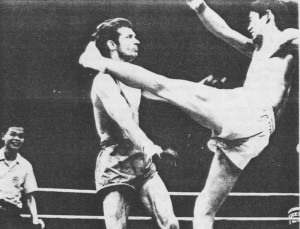
That day I was inspired. I went to the Kodokan after my first fight. I started training ( Judo) at 5pm and finished 9pm. The Japanese fighters were charming – but there were so many of them. They patiently waited for their turn to spar; they quickly got the message that I could not say no, that night I could hardly reach my hotel. I sat all night in a warm bathtub, as I could hardly stand up. I was lucky my next fight was twelve days away. I had plenty of time to recover.
My second fight was very exciting. Now that I think about it, the referee’s decision still surprises me. Three times I knocked my opponent down with powerful left hook. I remember I was surprised during the fight that my left hooks were working so well. It was simple, every time I extended my left arm; my Japanese opponent hit the floor. You must bear in mind; we were fighting with four ounce gloves. They were very tiny.
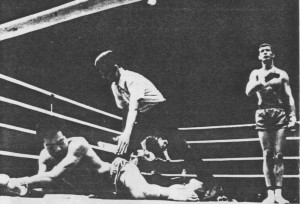
My intention was not murder my opponent, so I took it easy, to make the fight last for a while. I was pretty sure of my victory. Unfortunately, this was my downfall, I was vain, and the result was officially declared; a draw. I leaned that night that a boxer should fight strongly all the way, leave it to the referee to judge the fight. There were three judges, all of them Japanese, the referee was also Japanese, and so were my two corner helpers.
The Second Trip
I felt like a film star. In November 1969 I signed a contract with Marouam the Impresario., three fights were foreseen for November. In fact, I fought 4 fights, 1 each week. I don’t know if the organiser realized that in order to fulfil my contract, I had to come out unhurt from all my fights.
In November, the weather was fine in Tokyo. It was with Karate fighter Mr. Albert Boutboul, that I made the trip. Albert had also signed a contract for 3 fights. It was his first international fight. He had never seen such tiny gloves before. He was so surprised. It was his own interest to adapt quickly. They were predicting that 90% of the fighters would end with at K.O. so we shared our knowledge of the game.
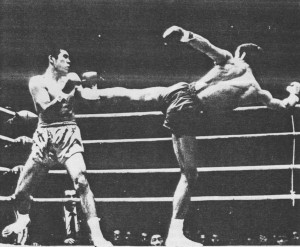
First fight! Albert Boutboul was first- I t was a hard, hard fight – whilst in his room analyzing the reasons for his defeat, it was my turn. It was not long fight, 1 minute and 22 seconds exactly. I struck the body of my opponent with a kick. Surprised, he stopped for an instant. I took this opportunity to connect a left hook with the 4 ounce gloves- he hit the floor hard. That night I had an early supper. Second fight Albert Boutboul won on points, I couldn’t do less. Vanity maybe, it stimulated me. It was only a return bout. I don’t remember my opponent’s name, but he was more careful, and it took me 2 rounds to floor him. Albert and myself celebrated our victories with Ark Nechem, a Frenchman who had been living in Japan for a year. He was our only support. We finished the night, sharing a Camembert dinner that my friend William Boutnet had sent me. We enjoyed it.
Normally after a fight I had Saturday off but the promoters asked me, as a favour, to accept an additional fight in Akita, in the north of Japan. I accepted. This was not a bright city lights affair, but a very modest ring. The spectators sat on the floor, no TV coverage. I won on points; you cannot force your luck! Last night, I had the impression that with each fight my opponents seemed to grow bigger and heavier. Optical illusion, for sure. I was never allowed to attend the weighing session of my opponents. I trusted the Japanese. I was a light weight; my Japanese opponent should also be light weight. My next opponent was at least 170cm tall. Surely he was not a small light weight.
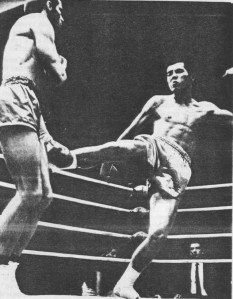
We fought very hard. I struck his face hard and saw one of his eyes swell and close. I finished the fight unmarked- I thought I had won. But the referee’s decision was an even match. I respect tradition.
I came back to France with stop over in Manila, Hong Kong, Bangkok, Karachi and Beyrouth. Let’s skip the details. It’ about boxing that I had to talk. It was good fun.
A victory with only one strike, a new storm hits the kickboxing industry
Presented below is an English translation from a Japanese news paper article covering one of Christian Guillaume’s fights held in Tokyo 1969.
Special thanks to Luc Cerutti for providing the Japanese news paper article and Yasuko Gemeiner for the English translation.
(C) Craig Gemeiner 2009
“Skills as quick as lighting, draws a hush over the audience.
The strength of French boxing”
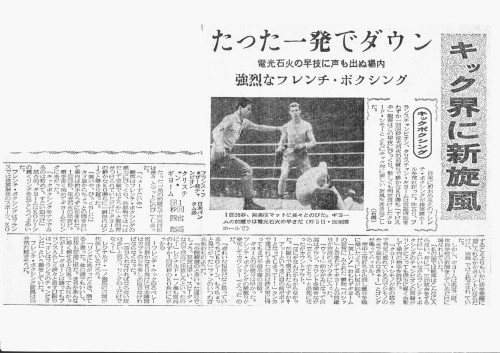
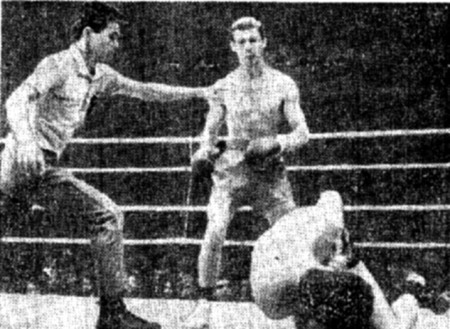
Picture – 1st round KO (58 seconds) of MIYATAKA with his body stretched out on the canvas. GUILLAUME’s front kick, (chasse frontal), fast as lighting at the Korakuen Hall.
French boxing made its debut in Japan, and stormed the Koraken Hall. On the 5th, the French feather weight champion, Christian GUILLAUME produced a brilliant KO victory over Japan bantam weight champion Shiro MIYATAKA taking only 58 seconds in the 1st round.
Wow! – The audience was surprised by this quick technique. Since advance reviews placed a question mark on the real fighting skills of French boxing, GUILLAUME’s brilliant KO victory produced a silence over the crowd.
A short time after the astonished sights, comments such as” He is strong ! I am so surprised!” followed by the eddy of the audience’s loud applause which wrapped around the Korakuen.
It only took 58 seconds in the 1st round using a light speed front kick. GUILLAUME approached the ropes red faced.
Before his fight, ” this is my first time to watch kickboxing. It is very powerful.” said GUILLAUME looking toward the continuous scene’s of KOs.
People had doubt if French boxing was real for fighting. Since French boxing was a sport for the nobility class in France, it is far more important to demonstrate the correct techniques and produce the aesthetic form rather than just trying for the KO.
However GUILLAUME, holding a 2nd dan in Judo and also being a teacher of physical education, was use to the situation. “In my country audiences do not attend so much. We only have 2-3 competitions each year.” said GUILLAUME.
Like a painting the double kick was followed by a long spinning kick. During the instant that everyone was admiring GUILLAUM’s beautiful kicking, his front kick splashed into MIYATAKA’s solar plexus with a sharp sound. MIYATAKA dropped forward to a bended position, and despite his repeated attempts to stand up, he was counted out.
MIYATAKA later commented – “I was not sure what happened in the ring when GUILLAUME kicked me. Was it a front kick that knocked me out? It was like a flash, my mind went blank.”
Carried out by a stretcher to his waiting room, MIYATAKA was still half in doubt with dubious expression.
” I warned MIYATAKA to watch out for those fast speedy kicks” said ICHINOSE a member of the Japanese contingent, ” I think there’s a lot of skills to be taken from French boxing.”
French boxing is fearful. The Japanese camp has to reconsider their game plane after MIYATAKA’s KO loss.
GUILLAUME finally commented, ” as soon as I entered into the ring. I knew I would win this fight. My body conditioning was fine, and my kicking was delivered well. But I didn’t imagine I would achieved a knock out that soon.”
Even though GUILLAUME had won, he spoke calmly in a French manner with a face expression that said – ‘ I am the French champion.’
French boxing, for a while, seems to be the rage.























